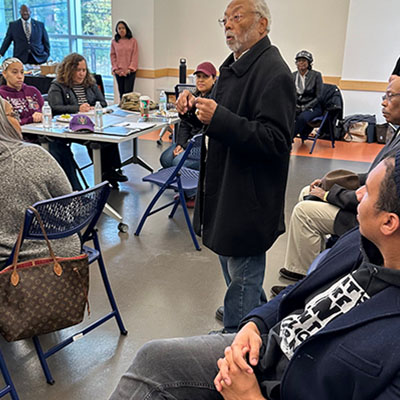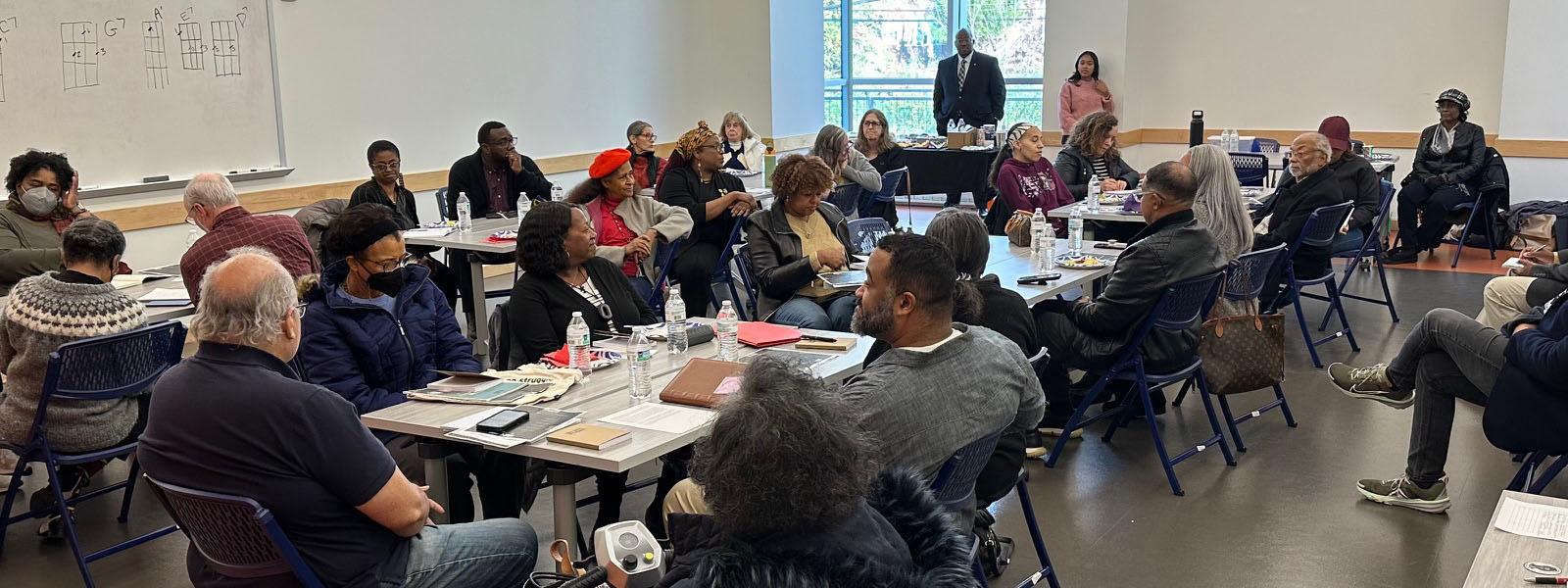Reparative Histories Social Justice Research Incubator
The 1856 Project Reparative Histories and Social justice Research Incubator (RHSJ)

The University of Maryland’s 1856 Project, part of the Universities Studying Slavery consortium, has been awarded a generous $200,000 grant from the Mellon Foundation Public Knowledge program to establish a two-year research incubator program that will investigate the legacy of slavery at the university and document histories of enslaved individuals, ensuring their stories and contributions are recognized, honored and preserved. The grant marks a significant milestone for The 1856 Project, providing momentum in advancing the Project’s aim to develop effective methods for research initiatives that reveal the truth about human enslavement and racism in institutional histories.
The RHSJ will select ten participants to serve as researchers to engage in community-driven projects centering on Black life, starting with the exploration of the lived lives of previously enslaved individuals and their connections to the genesis of the Maryland
Agricultural College (now the University of Maryland), including a deeper exploration into the institution’s long-ties to the Lakeland Community, one of the oldest
historically Black communities surrounding College Park.
RHSJ is honored to support the following community-centered projects by providing ten researchers (including community participants from Prince George's County) with a $5k stipend for their participation in the RHSJ Incubator. Participants will have the opportunity to engage in the following:
_________________
Bowie Ancestors Project
The projects will focus on African-American cemeteries and repatriation to undertake genealogical and historical research associated with a known enslaved community with possible ties to the University of Maryland. Researchers will explore possible connections between this community and the enslaved communities that supported the founding of the Maryland Agricultural College. Community and campus scholars may also undertake research on 19th century African-American funeral practices. We expect that historical and genealogical research may involve community partners, including churches, historical societies, and other community organizations.
___________________
The Lakeland Employee’s Oral History Project
The Lakeland Employee’s Oral History Project will conduct a detailed analysis of documentation identifying the University’s historical connections to the vestiges of enslavement in the United States. This project will focus specifically on the lives of Lakeland residents, who can be identified as some of the earliest African American individuals employed by the Maryland Agricultural College. Through new and already collected oral histories from their descendants and more traditional research sources, we will discover the conditions of their employment and the impact it had on the lives of those employees, their descendants, and their community.
Products will include at least ten new oral histories, the creation of transcripts for at least 20 pages of Maryland Agricultural College ledger pages, and the creation of a StoryMap or similar product showcasing the information gathered within the Lakeland/ University of Maryland community.
____________________
The White Marsh Historical Society

The White Marsh Historical Society (WMHS) is an independent cultural heritage organization
dedicated to documenting and honoring the enslaved families who contributed to the foundation of the Roman Catholic Church in America. In partnership with The 1856 Project Research Incubator, the WMHS will engage in “reparative genealogy,” integrating descendant community research and leveraging its expertise.
Specifically, for this two-year research incubator program, the WMHS research team will utilize its extensive research on the descendants of Mary Queen—an indentured servant brought to Maryland around 1715 and illegally enslaved—to lead the development of “micro-histories” for those individuals identified in the UMD work with the surname of Queen. Between 1722 and 1864, hundreds of people enslaved by the Jesuits were forced to labor on the White Marshplantation in present-day Bowie, Prince George’s County, Maryland. Many also worked on the neighboring Ayno-Bright Seat plantation in present-day Crofton, Maryland.
The current research suggests that some enslaved Queens were “loaned” to the MD Agricultural College, also inPrince George’s County. By accessing archival records, oral histories, and other resources, the UMD and WMHS can work together to reconstruct the narratives of the enslaved workers and acknowledge their contributions.
Since the treatment of the enslaved Queens was not unique, WMHS’s partnership will support the research of other cohort members by helping to develop strategies for uncovering narratives of resistance and survival. Additionally, this partnership will ensure that community researchers remain the agents of their own research, upholding the principles of non-extractive work.
Finally, the WMHS collaboration will also support the research incubator's goal of modeling by serving as publicity partners, sharing information with our national descendant-community network, co-leading workshops based on our expertise, and participating in training opportunities to foster mutual growth.
Upcoming Community Workshops for 2025
The 1856 Project’s RHSJ Incubator, will hold two community workshops in 2025 that will provide opportunities for members primarily from Prince George’s County to express interest in becoming a community researcher for the incubator and collaborate/network with other local descendant driven projects. Stay tuned for dates/times and locations!
Project leads:
Lae'l Hughes-Watkins, Associate Director of Engagement, Inclusion and Reparative Archiving, University of Maryland Libraries
Georgina Dodge, Vice President for Diversity and Inclusion, UMD Office of Diversity and Inclusion
Project team:
Maya Davis, Director, Riversdale House Museum
Traci Dula, Associate Director, University of Maryland Honors College
Maxine Gross, Founding Chair, Lakeland Community Heritage Project
Douglas McElrath, Head of Special Collections and University Archives, University of Maryland Libraries
Manuel Mendez, Graduate Assistant for Special Collections and University Archives, University of Maryland Libraries
Barnet Pavão-Zuckerman, Chair, UMD Anthropology Department
Angela Denise Rodgers-Koukoui, Lecturer
Violetta Sharps Jones, Vice Chair, Lakeland Community Heritage Project
Siobhan Alise Elizabeth Summers, Faculty Specialist, University of Maryland Anthropology Department
Supported by:

